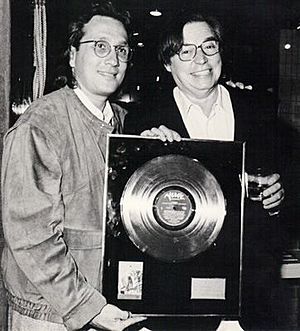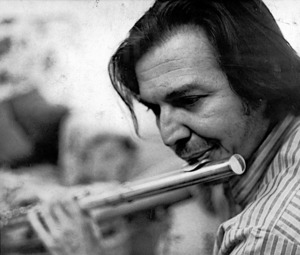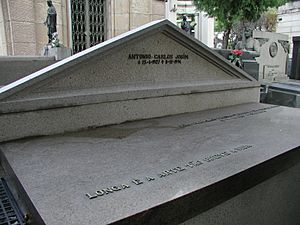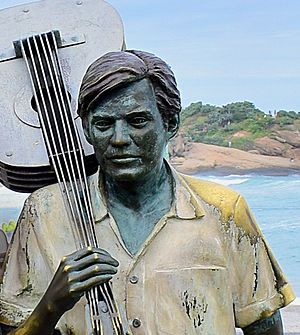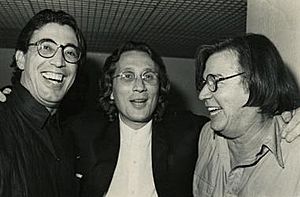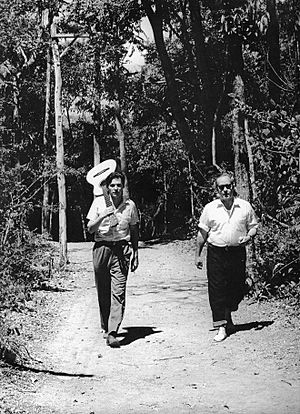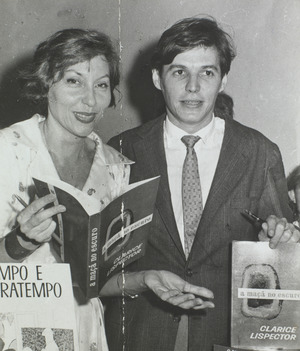Antônio Carlos Jobim facts for kids
Quick facts for kids
Antônio Carlos Jobim
|
|
|---|---|
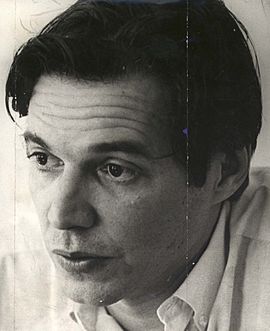
Jobim in 1967
|
|
| Background information | |
| Birth name | Antônio Carlos Brasileiro de Almeida Jobim |
| Also known as | Antônio Carlos Jobim, Tom Jobim, Tom do Vinícius |
| Born | 25 January 1927 Rio de Janeiro, Brazil |
| Died | 8 December 1994 (aged 67) New York City, U.S. |
| Genres |
|
| Occupation(s) |
|
| Instruments |
|
| Years active | 1945–1994 |
| Labels | Verve, Warner Bros., Elenco, A&M, CTI, MCA, Philips, Decca, Sony |
Antônio Carlos Brasileiro de Almeida Jobim (born January 25, 1927 – died December 8, 1994) was a famous Brazilian musician. People often called him Tom Jobim. He was a composer, pianist, guitarist, songwriter, and singer.
Jobim is known as one of the most important people in Brazilian music. He helped make bossa nova music popular around the world. In the 1960s, he mixed bossa nova with jazz music, creating a new and popular sound. Because of this, some people call him the "father of bossa nova."
Many singers and musicians have performed his songs since the early 1960s. In 1965, an album called Getz/Gilberto won a Grammy Award for Album of the Year. This was the first time a jazz album won this award!
The song "Garota de Ipanema (The Girl from Ipanema)", which Jobim wrote, became one of the most recorded songs ever. It also won the Record of the Year. Jobim wrote many songs that are now famous in jazz and pop music.
Contents
Early Life and Musical Beginnings
Antônio Carlos Jobim was born in Rio de Janeiro, Brazil. His father, Jorge de Oliveira Jobim, was a writer and diplomat. His mother, Nilza Brasileiro de Almeida, was only 16 when he was born.
When Antônio was a baby, his parents separated. His mother moved with him and his sister to Ipanema. This beachside neighborhood later became famous in his songs. In 1935, his father passed away. His mother then married Celso da Frota Pessoa, who really encouraged Jobim's music.
Celso gave Jobim his first piano. Jobim once said that he didn't like the piano at first. He preferred playing soccer! But his stepfather helped him see that music was a great path. As a young man, Jobim played piano in clubs and bars. He also worked as an arranger for a music company. This was before he became famous for his own songs.
Musical Inspirations
Jobim's music was deeply rooted in Brazilian traditions. He was inspired by Pixinguinha, a legendary Brazilian musician. His teachers included Lúcia Branco and Hans-Joachim Koellreutter. Koellreutter taught him about different kinds of music.
Jobim also loved the music of French composers like Claude Debussy and Maurice Ravel. Brazilian composers like Ary Barroso and Heitor Villa-Lobos also influenced him. Villa-Lobos was especially important to Jobim's musical style.
Jobim's songs often talked about love, joy, and nature. He wrote about the birds and beautiful places in Brazil. He mentioned the "Mata Atlântica" and his home city of Rio de Janeiro. He once said his music came from "the rain, the sun, the trees, the birds, the fish."
Music Career and Success
In the 1940s, Jobim started playing piano in clubs in Rio de Janeiro. In the early 1950s, he worked as an arranger. His first song, Incerteza, was recorded in 1953.
Jobim became well-known when he worked with the poet Vinicius de Moraes. They wrote music for a play called Orfeu da Conceição (1956). A popular song from this play was "Se Todos Fossem Iguais A Você."
Later, the play was made into a movie called Black Orpheus (1959). Jobim and de Moraes wrote new songs for the film. This teamwork was very successful. De Moraes then wrote lyrics for many of Jobim's most famous songs.
In 1958, the Brazilian singer João Gilberto recorded an album with two of Jobim's songs: "Desafinado" and "Chega de Saudade." This album started the Bossa Nova movement in Brazil. The beautiful harmonies in Jobim's songs caught the attention of jazz musicians in the United States. This happened especially after his first show at Carnegie Hall in 1962.
A big moment for Jobim's music was his work with American jazz saxophonist Stan Getz. He also worked with Brazilian singer João Gilberto and his wife, Astrud Gilberto. They made two albums: Getz/Gilberto (1963) and Getz/Gilberto Vol. 2 (1964).
The first Getz/Gilberto album made bossa nova super popular in the United States and worldwide. Jobim wrote many songs on this album. It became one of the best-selling jazz albums ever. Astrud Gilberto, who sang on "Garota de Ipanema" and "Corcovado", became an international star.
At the Grammy Awards of 1965, Getz/Gilberto won Album of the Year. "The Girl from Ipanema" won Record of the Year. Another famous song by Jobim is "Águas de Março" (Waters of March, 1972). He wrote both the Portuguese and English words for this song.
Working with Elis Regina
Jobim and singer Elis Regina first met in 1974 in Los Angeles. Regina was only 29 and new to the music scene. She was known as a "hurricane" because of her powerful voice. They created an album called “Elis & Tom”. It became very popular in the U.S. and around the world.
People who worked with them noticed their special creative connection. A guitarist-producer named Oscar Castro-Neves said their work felt very natural. They became close, and their teamwork showed in their music. The song Aguas de Março on their album even sounds like they are finishing each other's sentences.
Personal Life
Jobim married Thereza Otero Hermanny in 1949. They had two children: Paulo Jobim (1950–2022) and Elizabeth "Beth" Jobim (born 1957). Paulo became an architect and musician, just like his father. Paulo's son, Daniel Jobim, also became a pianist and composer. Daniel performed "The Girl from Ipanema" at the 2016 Summer Olympics opening ceremony in Rio de Janeiro.
Jobim and Thereza divorced in 1978. In 1986, he married Ana Beatriz Lontra. They had two more children: João Francisco Jobim (1979–1998) and Maria Luiza Helena Jobim (born 1987).
Death
In early 1994, after finishing his album Antonio Brasileiro, Jobim had some health problems. He had an operation in New York City on December 2, 1994. On December 8, he passed away due to heart problems.
His last album, Antonio Brasileiro, was released after he died. He was buried on December 20, 1994, in the Cemitério São João Batista in Rio de Janeiro.
Legacy and Influence
Jobim is considered one of the most important songwriters of the 20th century. Many of his songs are now jazz standards. Famous American jazz singers like Ella Fitzgerald and Frank Sinatra recorded his songs.
Jobim was very creative with how he put harmonies together in his music. Some of his unique musical ideas became common in jazz music later on.
Many Brazilian musicians worked with Jobim or performed his music. These include Vinicius de Moraes, João Gilberto, Elis Regina, and Astrud Gilberto.
Jobim received a Grammy Lifetime Achievement Award in 2012. This award honors musicians who have made lasting contributions to music. On January 5, 1999, the airport in Rio de Janeiro was renamed after him. It is now called Galeão International Airport, or Tom Jobim International Airport. He even mentioned this airport in his song "Samba do Avião".
In 2014, Jobim was added to the Latin Songwriters Hall of Fame. In 2015, Billboard magazine named him one of the 30 most influential Latin artists ever.
Other artists have also honored Jobim. Singer Michael Franks dedicated his 1995 album Abandoned Garden to Jobim. English singer George Michael also said Jobim influenced his music. His 1996 album Older was dedicated to Jobim.
The official mascot of the 2016 Summer Paralympics in Rio de Janeiro was named Tom, after him. In 2015, a crater on the planet Mercury was named in his honor.
Discography and Compositions
|
|
See also
 In Spanish: Tom Jobim para niños
In Spanish: Tom Jobim para niños
 | Bayard Rustin |
 | Jeannette Carter |
 | Jeremiah A. Brown |


